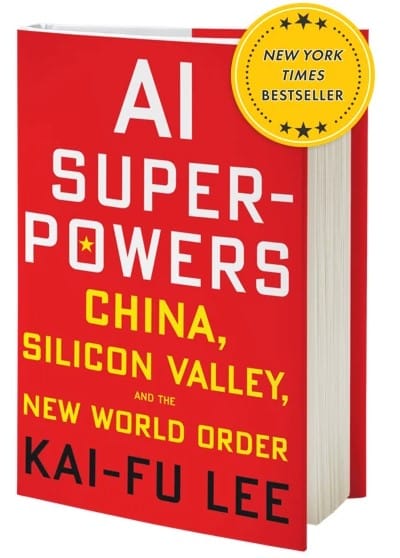
🤔 Wasn't China supposed to invent ChatGPT? That's what you said
"China will win the AI race!" was a commonly voiced fear until recently. But this has not been heard much since the release of ChatGPT. Once again, messy democracies were underestimated, and planned dictatorships were overestimated.
Share this story!
China will win the AI race, was a commonly held opinion and concern until recently. However, this viewpoint has become less vocal since the release of ChatGPT.
Many who held this belief referred to the book "AI Superpowers: China, Silicon Valley, and the New World Order" by Kai-Fu Lee. Given his background as a high-ranking executive at Apple, Microsoft, and Google's head in China, later becoming a venture capitalist in China, he was seen as a credible source. U.S. Senator Mark Warner even recommended the book to others in Washington with an interest in policy.
But Kai-Fu Lee made the same mistake as many others.

His argument for China's advantage in AI was based on the need for massive amounts of data for training, which China has due to its disregard for personal privacy.
"If data is the new oil, then China is the new Saudi Arabia," he wrote.
Chinese startups are also much more aggressive than their American counterparts and fiercely market-focused. The domestic market is huge, so these startups quickly become large companies.
American startups, on the other hand, were described as vague and more focused on "disruption".
Most importantly, it was a clash of two systems. A messy democratic system, unfocused due to unwelcome changes in power. Struggling to set and execute clear plans. The authoritarian system did not have these problems and had an ambitious and clear AI plan until 2030.
These factors, he believed, gave China a clear advantage.
Everyone has a plan until they get punched in the mouth
But, like many others, Kai-Fu Lee's main mistake was his faith in the authoritarian system. The messiness of democracies is not a weakness, it's a strength. The most important part of a plan is the ability to correct course.
Everyone has a plan until they get punched in the mouth, as Mike Tyson said.
The democratic system does not guarantee that the best decision is made at every instance or that the best leader or party is chosen. However, democracies are better at changing and correcting what goes wrong. Problems are inevitable. The best way to handle them is not to stick rigidly to a five-year plan but to be flexible and adaptable.
Since criticism is allowed in democracies, mistakes are brought to light and can be corrected. If the current leaders fail to do so, they are replaced.
This same messy system is also the best at creating new things, at innovating. The kind of "disruption" Kai-Fu Lee viewed as a weakness.
Such disruption suddenly gave the U.S. a wide lead in the AI race. The release of ChatGPT in November 2022 marked the beginning of a new era with generative AI. A dramatic breakthrough that changes the world.
Why such breakthroughs are much more likely in democracies than dictatorships was explained by Warp News three years ago, when many believed not only that China would dominate AI but several other areas as well. This is what Johan Norberg wrote in Opened or closed will determine China's future success:
Dictators don’t like surprises. And that is why sooner or later, their societies stagnate. Thriving, innovative economies rely on experiments, feedback and trial and error, and they are unpredictable by nature.
I also wrote on the same theme in China will not dominate the world unless it becomes a democracy:
The internet could never have been born in China. So the next internet, the next revolution of the same dignity as the internet will be born somewhere else.
This is what happened. Generative AI is a revolution on par with the internet. It was not included in China's AI plan. It was born in the messy, vague – and democratic – United States.
What happened to Kai-Fu Lee? He has started a generative AI company in China, which is based on AI technology licensed from... Facebook.
Mathias Sundin
The Angry Optimist
By becoming a premium supporter, you help in the creation and sharing of fact-based optimistic news all over the world.


